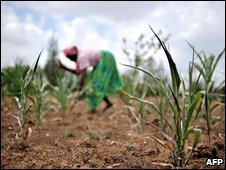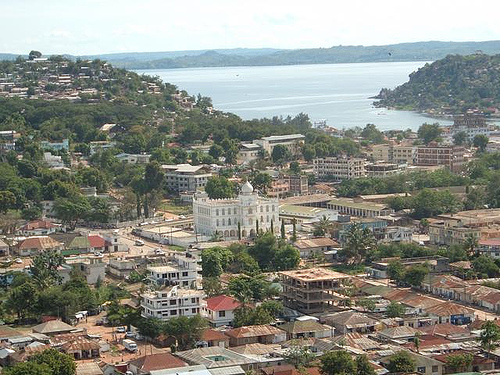 In Tanzania the greatest economic possession the poorest can have is his hand hoe. In rural areas of the country and elsewhere, those possessing land — which is supposed to be the greatest asset they can have — do so virtually. In the actual sense they disown it because it is unregistered land. The government requires that every plot be legally registered. To acquire this license, one must go through a bureaucratic process that costs well above Tshs 1,000,000, excluding the extra costs one might incur through bribery (this is for a land that is/slightly less than half the size of a football pitch). This amount of money is equivalent to a yearly salary of an average government employee.
In Tanzania the greatest economic possession the poorest can have is his hand hoe. In rural areas of the country and elsewhere, those possessing land — which is supposed to be the greatest asset they can have — do so virtually. In the actual sense they disown it because it is unregistered land. The government requires that every plot be legally registered. To acquire this license, one must go through a bureaucratic process that costs well above Tshs 1,000,000, excluding the extra costs one might incur through bribery (this is for a land that is/slightly less than half the size of a football pitch). This amount of money is equivalent to a yearly salary of an average government employee.
Rural communities in Tanzania are largely dependent on agriculture that is practiced only once in a year, limiting the variety of cultivated crops and productivity. For many it is subsistence farming the output of which is neither enough for themselves nor the country. The most important tool is the hand hoe. In times such as these exacerbated by a wide spread country-wide shortage of rains and escalating world food prices, a threat is imminent that a major hunger is along the way. In fact in places such as Mwanza in the Northern part of Tanzania, food aid is currently serving lives.
They preach to us about Kilimo Kwanza claiming that they would support the peasants with modern farming. But the truth is that this is a great concept that is ill implemented or rushed into. I will offer one explanation. They provide mortgaged agricultural tools such as machinery (e.g. Massey Ferguson) to the peasants provided that they have an immovable security. This security means a stripe of licensed land. All but a few can afford this mortgage.
In a country that depends on agriculture to power her economic growth up with more peasants than commercial farmers, expect nothing but a collapse of the economy and rampant poverty.
Let us be true to ourselves. Persistence farming will take us nowhere. New approaches that are simple and implementable must be employed. For example, why don’t we organize these farmers into small groups in their villages and lend them agricultural machinery and other tools at a payment that would be agreed responsibly? With known groups we provide them with agriculturists to assist them in adapting their farming practices into modern farming with an eye on commercial farming. Then mobilize them into unions so that they have a greater say on their products with regards to prices.
The majority of Tanzanian soil is underused with huge potential for commercial farming. In regions such as Bukoba, Kagera, there is a lot of rains which can allow farming three times a year in intervals of four months. Bukoba itself can feed the entire country with cereals, milk and meat. When there is scarce rainfall irrigation schemes would be used which are well suited for the region given the large water swamps, valleys, rivers and lakes. A one-time investment in solar-water pumps could be used serving for 20 – 25 years. Other regions of Kigoma, Arusha, Kilimanjaro, Mbeya, Mwanza and so on can be used for export oriented farming. We need a well-thought out plan.
They tell us that the world is becoming a village characterized by competition in science and technology and possibly united by one language of English. Great advances in science and technology lead by the West are driving this globalization. Africa is being discovered. At a time when the US and other developed countries are developing intelligent and autonomous systems — be it rescue robots or driver-less cars — in Tanzania, about 30% students pass their secondary school entrance English exams in standard seven. (The level of numeracy and science is not the subject of scrutiny for this article.) About 50% of standard seven students ascend to secondary schools. If we trace these students all the way to secondary school through university, we find a flawed education system. What are we going to do with all those that are left behind 20 – 50 years to come? “Education is the driver of economic growth.” Science drives sustainable economic development. Tanzania is crying and the country is in crisis. We must know exactly what we want.
With not only limited resources of teachers and teaching materials, but also low level of education affordability we cannot afford a primary school in every village and a secondary school in every ward while ensuring a 21st century education. Pupils are hungry. At home there is no electricity. Libraries are empty. They cannot afford school uniforms. Some travel many kilometers before they can find the nearest school.
Great things have not come overnight. We do not need schools on every village or ward. We need education centers. For primary schools, several villages could depend on just one center. This center would bring together 3000 – 5000 students under one compound with storey buildings. Provide proper accommodation for those who cannot afford or come from distant places, concentrate instructors, establish libraries and laboratories, abolish school uniforms and all major fees and offer regular training to instructors.

It is natural for cities to grow. A November 2010 UN Habitat Report estimates that by 2050, 60% of Africans will live in cities tripling the number of urban residents. Mwanza is one of the fast growing cities in Tanzania. It is rightly nicknamed “The Rock City” due to its rocky hills. With the establishment of new businesses, the cost of living is becoming more and more expensive for the poor.With time the poorest are being forced to leave the inner city and go to the outskirts concentrating themselves in small compounds in the rocky hills. The process will continue for many years, and many will be forced to live in poorly serviced settlements. If un-watched I see a growth of another big slum in East Africa. Others are Kibera and Mathare which can both be found in Nairobi, Kenya.
It is not impossible and is never too late and I hope the Tanzanian fish has not started to rot, for the Chinese have warned us that if it does rot then it does so from the head.


Again a comprehensive piece of article at vijanafm.
Maybe we should keep on being creative and innovative.
We have acute shortage of electricity, we should suggest to the government to stop taxing solar items and equipments so we can utilize the blazing sun.
Dawasa have proved to be useless and can’t be fixed, which means water bore ling and drilling should be regulated and supported for those who can afford.
In your article you talked about our vast land, unused land, people could be encouraged to use it accordingly (mind you we don’t need to farm and build every inch of land, open space and forests are good for us). Fertile lands we could employ your methods, for dry ones like in Dodoma maybe we should encourage vineyards, livestock and poultry farming.
Tanzanians are artistic, maybe more support and guidance should be directed towards these positive attributes to motivate our people to express themselves in solving our problems.
In encouraging and supporting creativity we might reduce the cheap and cowboy imports flooding our nation.
Bihemo, this is truth mzee! I very much liked your suggestion about grouping farmers and collaborating on prices *responsibly*. It makes a lot of sense for the main stakeholders, who are the farmers themselves (instead of those bureaucrats you refer to).
Here are four articles I’ve picked up recently in newspapers here in Dar that are evidence to your piece:
(1) Some people are differing with our president on who/what is at fault for continuing power shortages: http://bit.ly/oA9hEo
(2) The World Bank released a report recently titled “Yes Africa Can: Success Stories from a Dynamic Continent” – an extract from The Citizen: “Asked why in the case of Tanzania economic benefits were slow in seeping to the rural masses ravaged by poverty, the [World Bank] official said lack of requisite infrastructure and insufficient energy supply were some of the inhibiting factors. He said poor agricultural investment was another factor.” (more here: http://bit.ly/qhZBxF)
(3) The Daily News reports that “Dar bans food crops export” effective 1st July for six months because “pockets of famine existed in 48 districts”: http://bit.ly/rapIjA
(4) The Tanzanian government has been urged, yet again, to invest in the 68% of the population which will carry the country tomorrow: The youth. More here: http://bit.ly/o2T4UN
As I said, you speak truth. Je, tutaendelea vipi?
dd-m, I agree with you above about focusing on creativity. Whatever happened to allowing citizens the freedom to try new things, economically even? Aren’t they supposed to lead the change they want to see? So why, as dd-m puts it, do these “cowboy imports” flood, nay, drown the creative processes within our borders?
@Kondakta, its laziness combined with “ukoloni mamboleo”, from top to bottom of our leadership, we are too selfish, its me me all the way.
Currently for a leader, so long as your family is sorted, you don’t feel any responsibility to the people who elected you.
There is a great article at Raia Mwema about wabunge wetu, http://bit.ly/qmL5cs, if this is true then we are doomed!
Encouragingly, I have witnessed and done business with some small traders, I tell you, Tanzanians are resilient, very inventive in sorting their daily problems.
We wish the leaders would be supporting us rather than pulling us down, or napping in the Parliament, http://bit.ly/oEnVIBl!
@bihemo I’ve observed some action on the part of our government in the last couple of weeks; for example, they implemented a ban on food exports to ensure that we produced for local food needs (and indirectly also encouraging more subsistence AND commercial farming), and the electricity problem doesn’t seem to be so bad anymore here in the city. The food export ban might not be a permanent solution, but it helps us be prepared for any drought conditions entering our borders. Perhaps we can even assist our neighbors who may be suffering more from the drought in the drylands… and the electricity problem, well, we seem to have ways to go bado but at this point something makes us happier than nothing.